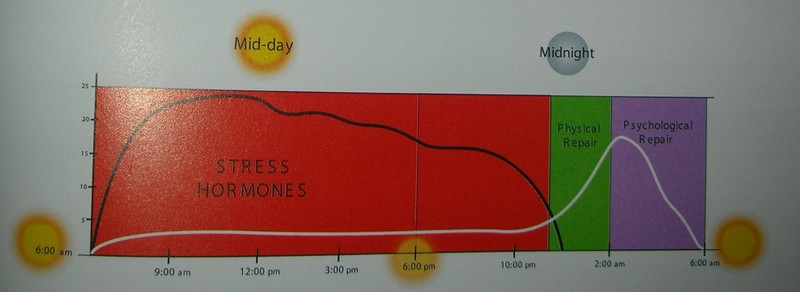

 One of the biggest obstacles I face when coaching people to optimal health is getting them to understand the importance of going to bed on time. Today's world of late night TV and bright lights at touch of a switch make it easy to forget that for thousands of years we lived in sync with the light and dark cycles of day and night. Our physiology is still the same as our ancient sun-driven ancestors, we are simply packaged in fancy clothes, drive cars and use lots of electronic gadgets. Despite the availability of artificial, 24-hour, 365-days-a-year light, we are still tuned to the natural rhythm of daily and seasonal light/dark cycles.
One of the biggest obstacles I face when coaching people to optimal health is getting them to understand the importance of going to bed on time. Today's world of late night TV and bright lights at touch of a switch make it easy to forget that for thousands of years we lived in sync with the light and dark cycles of day and night. Our physiology is still the same as our ancient sun-driven ancestors, we are simply packaged in fancy clothes, drive cars and use lots of electronic gadgets. Despite the availability of artificial, 24-hour, 365-days-a-year light, we are still tuned to the natural rhythm of daily and seasonal light/dark cycles.
The best way to illustrate my point is to share my own experiences. A few years ago, I began to suffer from a number of nagging ailments such as neck pains, headaches, skin changes, itching, poor recovery from exercise, forgetfulness, dyslexic behavior and was having a hard time focusing at work. I tried several different approaches, and although my health improved, I still noted a general fatigue and lack of focus.
I consulted Dr. William Timmins, a naturopathic physician and founder of BioHealth Diagnostics in San Diego, California, in order to get to the bottom of what prevented me from a full recovery. During our initial consultation, Dr. Timmins asked me to describe my work schedule and a typical day. I explained that for many years I had lectured all over the world, a schedule that had me on airplanes and in many different countries for about six months each year. Most nights I would work until after 1 a.m. Even though I got about seven hours of sleep each night, I usually woke up feeling tired.
Dr. Timmins recognized that the majority of my symptoms were due to circadian cycle disruption and sleep deprivation. He convinced me that no matter what else I did, until I got to bed by 10:30 p.m. and got a full eight hours of sleep, I'd be wasting my time and money! While the night owl in me dreaded the thought of changing my schedule so dramatically, I respected his opinion and followed his advice. The changes in my body were dramatic. Within the first week my energy levels and concentration improved and my headaches and neck aches were dramatically reduced. I continue to follow Dr. Timmins' advice to respect my natural sleep/wake cycles and I feel great!
Cirkadian Cycle A natural physiological cycle of about 24 hours that persists even in the absence of external cues. |
Our Natural Sleep/Wake Cycles
The cycles of light and dark that result from the movements of the sun and planets affect nearly all living creatures. Even though humans had the ability to use fire thousands of years ago, our activity and sleep schedules were still very much in tune with the sun and our environment. To illustrate how influential light is over the physiology of all life in nature, consider that during the solar eclipse on August 11, 1999, birds, horses and many other creatures went to sleep in the middle of the day when the sun was eclipsed.
Whenever light stimulates your skin or eyes, regardless of the source, your brain and hormonal system think it is morning. In response to light, your hormonal system naturally releases cortisol. Cortisol is an activating hormone that is released in response to stress, light being a form of electromagnetic stress. This activates the body and prepares it for movement, work, combat or whatever may be necessary for survival. We must remember that our physiological systems were well developed long before we even began using fire, so as far as your body is concerned:
Light Sunshine = Cortisol release = Daytime activities.

Figure 1: Natural sleep/wake cycle.
Many of our hormones are produced in tune with the cycle of the sun. Stress/activating hormones (black line) are produced as the sun rises and peak around mid-morning. As the day progresses, the levels of stress hormones decrease. The body then begins to increase production of growth and repair hormones (white line) as the sun goes down. Our bodies are designed to wind down from sunset until about 10 p.m. when sleep and physical repair should begin. Psychogenic repair takes place predominantly from about 2 to 6 a.m.

Figure 2: Disrupted sleep/wake cycle.
A typical day for many involves elevated stress levels, resulting in increased levels of stress hormones throughout the day (black line), resulting in decreased levels of growth and repair hormones (white line). Although the healthy body can bounce back from intermittent circadian stresses, chronic (long-term) circadian stress often leads to depressed immunity, illness and chronic fatigue.
Factors That Can Disrupt Your Sleep/Wake Cycles
1. Stimulants
What do you do for a pick-me-up when you ae tired? Most people reach for something sweet, drink a beverage containing caffeine or smoke a cigarette. Some will have coffee with sugar added—while they smoke! Caffeine, sugar and tobacco are all stimulants, which excite your sympathetic nervous system (your fight or flight response). This triggers the release of (you guessed it!) cortisol! Remember, cortisol tells your brain that it's time to get up in the morning or that it's time for action!
The most popular form of caffeine is coffee. An eight ounce cup of strong coffee contains about 300 mg of caffeine. Caffeine has a half-life of about six hours. So, if you have coffee at 3 p.m., you'll still have 150 milligrams (mg) of caffeine in your blood stream at 9 p.m. Six hours later, well into the psychogenic repair cycle of immune function, you'll have 75 mg of caffeine stimulating your adrenal glands to produce cortisol. Ideally, you should not drink anything containing caffeine after lunch and throughout the evening.
One teaspoon of sugar has been shown to suppress your immune system for as long as four hours. When you consider that the average can of soda contains ten teaspoons of sugar, or that the average breakfast cereal is comprised of between 46% and 53%sugar, you can see how easily sugar finds its way into your diet.
A diet that does not match your metabolic type typically results in large fluctuations of blood sugar levels. Blood sugar levels elevate after eating, triggering the release of insulin to break down and store the blood sugar. This often results in an overcompensation response, which in turn leads to a blood sugar low. Unfortunately, your brain considers low blood sugar to be a dire emergency, a major stressor. Stress hormones are released to counterbalance the condition by triggering the liver to release stored glycogen, which elevates blood sugar. Meanwhile, most people feel the effects of low blood sugar, and, before their liver can do its job, they have another sweet snack or caffeine to keep them going. This cycle keeps cortisol levels high, preventing the body from winding down in the evening and getting a good night's sleep.
2. Electromagnetic pollution
Unless you regularly sleep in a cave miles away from human civilization, you are probably exposed to low frequency electromagnetic energies. Power lines, electrical circuits in your walls, ceilings and floors and electrical appliances such as electric blankets and TVs all emit such energies. This electromagnetic pollution can disrupt natural sleep/wake cycles.
3. Entrainment
Physiologists and medical doctors have found that you can be entrained, or synchronized to a dysfunctional schedule in as little as 7-21 days. This means that if you stay up until midnight for 1-3 weeks in a row, your internal body clock will become trained to wait until midnight to start reducing cortisol output and increasing melatonin production. Just because you didn't start the physical repair on time doesn't mean it's going to get jammed in. Your natural rhythms will automatically begin the psychogenic repair around 2 a.m., thus robbing your body of two good hours of physical repair. If your body gets used to going to bed late and you then decide to get to bed earlier one night, you'll probably find you have a hard time falling asleep at 10:30 p.m. Now you're faced with the task of entraining your system to release your sleepy-time chemicals early enough so that you can get to sleep on time for a full cycle of physical repair.
For some this is difficult. We live in a world where it's easy to move from one time zone to another just a few hours of travel. Some people find that their physiological rhythms, including their sleep wake rhythms, are synchronized to the rise and fall of the sun in the time zone where they were born brought up. This may be completely different from the place that they currently live. If you're suffering from chronic conditions or pain, and if you have difficulty adjusting to the natural sleep/wake cycle of the place where you live, you may have to return to the time zone where you were born and spent your early years to get better.
|